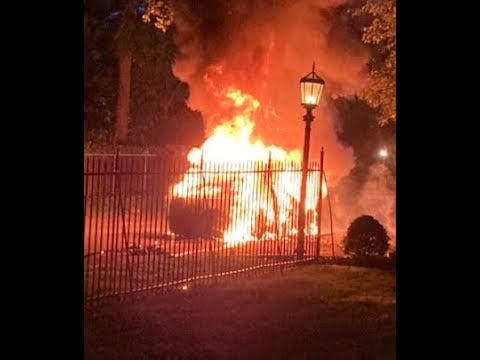The Australia government is investigating the impacts of EVs on its grid, taxpayers and motorists themselves. It’s all discussed in an Australian article that can be found here. This is the part that got my attention:
[T]he House of Representatives continues its inquiry into impact of the wholesale uptake of electric vehicles, or EVs, including infrastructure and costs to motorists..
The inquiry seeks to establish the wide-reaching impacts of widespread EV take-up, including batteries, and is chaired by South Australian Labor MP Tony Zappia.
It was told the recycling sector was “in crisis” over the handling of disposed batteries, namely from vapes, which according to research had resulted in 10,000 fires in just 2024.
Association for the Battery Recycling Industry chief executive Katharine Hole said “recycling of lithium batteries is inherently dangerous” and required safety and fire measures.
She said the “waste industry was struggling because of battery disposal and fires” and insurance for BRI members had increased in 2024 by as much as 200 per cent.
The inquiry was told disposal of EV batteries, namely recycling, required “engagement of a professional network” and Australia needed to “work up the waste hierarchy”.
That insurance part was intriguing oooo99o9o9 that industry has to get its numbers correct if it hopes to survive financially. It wholly depends on accurate assessments of risks and evaluates those risks from experience. When rates go up 200% that means the risk has tripled and the industry knows that from claims it has received.
oooooo
More information on those risks can be found on the website of the National Waste & Recyling Association and here is some of what it has to say:
A new report from the National Waste & Recycling Association (NWRA) and Resource Recycling Systems (RRS) estimates that more than 5,000 fires occur annually at recycling facilities. Materials recovery facilities (MRFs) process single stream recycling and, increasingly, these facilities experience catastrophic fires due to lithium-ion batteries erroneously placed by consumers in with their recyclables.
Every day, MRFs receive dozens of lithium-ion batteries due to public misconceptions about how to properly dispose of them. As lithium-ion battery usage grows, so will the risk of fires.
“Lithium-ion batteries are in more items than we might think,” said NWRA Interim President and CEO Jim Riley. “Besides recycling facilities, these batteries are a threat to the entire solid waste and recycling system, from collection to disposal, and impact our members every day. Given the risk they pose, it is important consumers understand that lithium-ion batteries should not be placed in their waste or recycling bins and should be disposed of properly through the right channels.”
The report also noted that the increased risk of MRF fires has driven up the cost to insure these facilities. The rate of catastrophic losses has risen by 41% over the last five years. As a result, insurance has increased from less than 20 cents per $100 insured property value to as much as $10 per $100 insured, as providers began to understand the threat to MRFs from fires, according to members of the insurance industry. The risk of fires and the cost to insure against them is expected to rise in the coming years as the use of lithium-ion batteries continues to grow exponentially.
So, the NWRA says insurance costs have actually increased from 20¢ to $10 per $100 insured. That’s a 4,900% increase, not a 200% increase. Lithium-ion batteries, the foundation of the EV industry, are that dangerous. And, we have a government promoting full electrification and EVs for everyone based on a climate crisis that isn’t. How much more of this insanity are we going to tolerate?
#EVs #Batteries #Lithium #Fires #Insurance #Australia





Thanks for the heads up - people need to be careful how they throw things out. Just one county in Oregon reported this - "Deschutes County Solid Waste Director Tim Brownell said his county’s landfill has seen 21 lithium-related fires in the past three months. Staff went from seeing battery fires once a month to multiple times a week...Lithium batteries can be found in a variety of household objects, ranging from cars to power tools and from e-bikes to birthday cards that play music when opened. When run over by tractors or crushed in a trash compactor, they have the potential to explode and catch fire."
Where there is smoke - "JUST ADD WATER" nobody gives a sh.t about their sh.t. All these lovely chemicals don't just go up in smoke to contaminate local atmosphere. It all gets washed down the drains to be discharged "Untreated" to the nearest water environment. Don't you just love the "Greens" circular economy.???